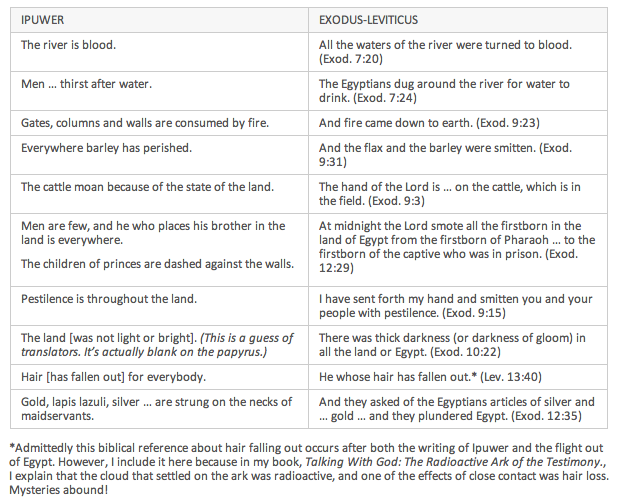
The evil forces of information and thought suppression such as Doug Weller at Wikipedia's unofficial censorship bureau are losing their war on information by failing to censor all scholarly and published connections between Ipuwer and the Exodus: Passover In Egypt: Did the Exodus Really Happen?
This question has puzzled biblical scholars, archeologists and all those interested in solving one of the Old Testament's most intriguing mysteries. Was the story of the Israelites fleeing Egypt after years of slavery history or myth? Were there really 10 plagues that became so progressively terrible that they forced the Pharaoh to finally release all the Israelite slaves? Was there really a leader named Moses, and did he guide this "mixed multitude" for 40 years in the wilderness of the Sinai desert?
Passover is the Jewish festival that celebrates the flight of the Israelites out of Egypt. During this Passover season it is particularly pertinent to wonder, did the Exodus really happen?
Clues and speculations abound regarding alleged items of evidence discovered for the Exodus, and nearly all have their champions and detractors. It seems that every time a theory is proposed and the Exodus mystery appears to be solved, it is quickly shot down for one reason or another.
Nevertheless, ongoing archeological and etymological investigations into the Exodus have produced some tantalizing items and scholarship. Presented for your consideration are Exhibits 1-4. Read and wonder...
Exhibit 1: The Ipuwer Papyrus
How could plagues described in an Egyptian papyrus be so similar to those found in the Bible?
In the early 1800s, a papyrus was found in Egypt called The Admonitions of an Egyptian. It is now in the Leiden Museum in Holland. An Egyptian named Ipuwer wrote it at the end of the Middle Kingdom, around 1650 B.C.E.; scribes copied it in the 19th Dynasty, in the 1200s B.C.E. Below are some of the amazingly similar plagues described in both the Ipuwer papyrus and the Bible. (The biblical plagues befell the Egyptians at the time of Moses and the Exodus, which has been dated sometime between 1570 to 1290 B.C.E.)
The disparity of the dates between the Ipuwer and Exodus documents is enough to convince many scholars that no relation exists between the two. In addition, prevalent theory now claims the papyrus is simply ahistorical. Be that as it may, the similarities are striking, and why they are remains a mystery. Could it be that the scribes who copied the document at the time of the Exodus were experiencing similar calamities to the earlier ones and were using Ipuwer's words to warn the present-day Pharaoh?















No comments:
Post a Comment